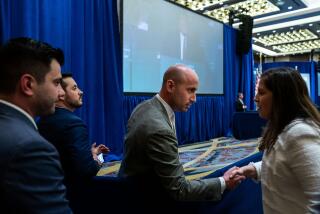Franchises Give Minorities Way to Go It Alone : Seminar Opens Door for Those Pondering Business
- Share via
Until Friday, Troy Johnson said, he had dreamed of starting his own stationery store from scratch. But Johnson now figures he has a better chance of realizing his dream if he becomes a franchisee of a well-established company.
The change in plans came after Johnson attended Friday’s seminar and trade fair--organized by the National Assn. for the Advancement of Colored People--aimed at encouraging members of minorities to consider franchising as a way of starting their own business.
More than 150 participants learned of the benefits and drawbacks of franchising during the daylong event at the Holiday Inn Crown Plaza. It also drew more than 20 franchisers and industry consultants to lend advice.
The NAACP says that, based on some impressive statistics, the franchising industry is worth looking into. According to the International Franchise Assn., the current 500,000 franchise outlets in the United States employ 7 million people and are expected to generate $600 billion in revenue this year.
Fred Rasheed, director of the NAACP’s Economic Development Program, which organized the franchising seminar and a similar event in Chicago earlier this year, noted that franchises are expected to boost their share of the nation’s retail sales to 50% by the year 2000 from the current 33%. “It is imperative that blacks and other minorities become involved and share in that growth,” he said.
No Easy Matter
“The success rate of franchise businesses is greater than start-ups because franchisers provide the support base (training, advertising, accounting methods) that one needs to succeed,” Rasheed said. Using the track record of established franchises, a new franchisee often finds it easier to get a loan than does a person starting a business from the ground up.
Still, buying and running a franchise business is no easy matter, industry executives pointed out.
“You have to be prepared to mop the floors, take out the garbage and deal with employees,” warned Dennis V. Horsfall, vice president of ServiceMaster, a residential and commercial cleaning company. “And when customers see the store sign, they expect certain standards. If you are not prepared to conform to that, you should think twice” about becoming a franchisee.
The money needed to buy and equip a franchise--which varies in many cases from $25,000 to $500,000 and more--is still a major obstacle. Some franchisers, like McDonald’s Corp., will allow some franchisees to lease a restaurant site for three years before requiring them to come up with the nearly $500,000 needed to buy and equip a restaurant. Low-interest loans from the Small Business Administration and other agencies are also available.
The seminar’s participants were advised to investigate a franchiser’s track record before signing any agreements. “They buy a franchise based on emotion,” said Robert K. McIntosh, a franchising consultant. “They don’t look at (all) sides and see what they are going to get involved in.”
Being able to finally buy a franchise does not signal an end to problems. Ironically, one day before the seminar, the Los Angeles chapter of the NAACP announced the creation of a task force to resolve complaints made by franchisees of Southland Corp., owner of the 7-Eleven convenience store chain and a co-sponsor of the franchise fair.
Black store owners claim that Southland has prevented them from buying franchises in white communities and imposed financing arrangements that have jeopardized some owners’ ability to stay in business.
Rasheed said the problems with Southland are commonplace among minorities once they become part of a franchise operation. “Blacks are limited to the most depressed communities, where it’s more difficult to do business,” Rasheed said. “The crime rates are higher, and the work force is less educated.”
Johnson, the potential stationery store owner, busily scribbled notes during the morning seminars. “It has made me more motivated,” said Johnson, a 32-year-old Los Angeles County mental health planner who is black. “But it also makes me want to proceed with caution.”
More to Read
Inside the business of entertainment
The Wide Shot brings you news, analysis and insights on everything from streaming wars to production — and what it all means for the future.
You may occasionally receive promotional content from the Los Angeles Times.










